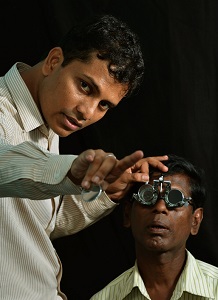Join a powerful, unprecedented alliance for better eye health for all.
Join IAPB-
Choose an alternate language here
Brien Holden Vision Institute (the Institute) with support from SiB Phase 5 has initiated an optometry degree programme in partnership with Institute of Human Resource Advancement, University of Colombo (IHRA, UOC) in April 2014. The goal of the project is “development of a recognised optometry training programme in accordance with the HRD component of the National Eye Care Plan of Sri Lanka”. Other key stakeholders include Ministry of Health and Nutrition; V2020 Secretariat; the ophthalmic technologists; and private sector practitioners.

The programme plans to prepare professional eye health workers who are able to provide the full range of optometric services required to function in a multi-disciplinary team focused on comprehensive eye care; and it will develop the local capacity of optometry faculty in clinical care, teaching and training, and research to ensure that eye health care becomes more accessible.
The project is in its initial phase and has faced a number of challenges during the implementation of certain activities. The foremost among these challenges is the complexity of university education system which requires any new degree programme to go through multiples approvals before it’s launched. The approval system gets more challenging due to frequent changes in the senior management at the university and political changes in the country.
The key learning from the first phase of the project is that:

Regional Director, South East Asia & Eastern Mediterranean
Brien Holden Vision Institute
[email protected]